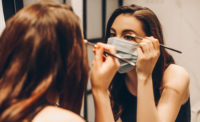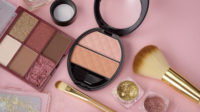Beauty Trends Above the Mask Focus on Eyes

Demand for products like eye shadow are on the rise as consumers experiment with "above the mask" beauty, while sales of lipstick are on the decline.
Eye makeup sales are up 204% year-over-year for the three-month period ending on June 28, according to Kantar Media. Suddenly how-to guides for bold eyes and tips for how to apply mask makeup are popping up everywhere among beauty influencers on YouTube and TikTok, with the latter amassing more than 53 million views from videos tagged #MaskMakeup.
Lipstick, on the other hand, has been an early casualty of the pandemic, with Amazon sales of "lip care and color" dropping 15% and prices declining by 28% for the month ending on April 11.
"Due to COVID-19, consumers' values and behaviors around the world are changing dramatically .... frequencies to use makeup like lipstick are decreasing as people go out less and wear masks," Shiseido CEO Masahiko Uotani said on a call with investors last week, after reporting one of the company's worst losses since the early 2000s recession.
The demise of lipstick is challenging the "the lipstick index," a term coined by Estee Lauder chairman Leonard Lauder in 2001 to explain the rise in lipstick sales during periods of economic turmoil. Though his theory failed to prove true in subsequent years — including the Great Recession, when NPD Group found lipstick sales actually dropped by 9.8% — it became a way to describe the phenomenon of turning to small luxuries during periods of economic instability.
In a recent interview with WWD, Lauder said the concept of the lipstick index could pave the way for new versions of accessible luxury during the coronavirus pandemic, with shoppers turning to products like eye makeup and skincare.
"We could talk about a 'mascara index' or 'nail polish index,' but I wouldn't call it a hard and fast mathematical correlation. It's more anecdotal," Lauder told WWD.
Lipstick sales aside, McKinsey wrote in a May report that the beauty has proven "relatively resilient" thus far, though it still has a long way to go to make up for lost sales when stores were temporarily shuttered early in the pandemic. McKinsey anticipates that the overall global beauty market — currently valued at $500 billion — will decline by 20-30% in 2020 as a result of the coronavirus.
Still, some beauty brands are finding silver linings amid the coronavirus outbreak with growth in eye makeup and skincare sales. Alibaba saw early success in this category in China, reporting 150% month-over-month growth for eye cosmetic sales during the week ending February 18.
As well, companies like L'Oreal announced plans to start doubling down on eye makeup products.
"Obviously, when you can't see the lips, eyes are super important," L'Oreal CEO Jean-Paul Agon said on an earnings call earlier this month. "And so we want to develop very strongly the makeup for eyes or stay-on foundations and there will be opportunities."
Likewise, Amazing Lash Studios, a chain of more than 250 beauty boutiques in the US, reported a 22% increase in digital clients leads since the start of the pandemic. Others, like My Beauty Brand, experienced a recent rise of 480% in eye makeup sales, and Tweezerman reported an uptick of 330% in eyelash curler sales, the Telegraph reported.
Meanwhile, skincare sales are also booming as Americans seek out self-care resources and ways to mitigate the rise of "maskne" — a nickname for zits and pimples caused by masks. According to Vogue Business, at-home beauty tools like facial steamers, as well as serums including Vitamin C and hyaluronic acid, have been among the top rising beauty trends during the pandemic.
Looking for a reprint of this article?
From high-res PDFs to custom plaques, order your copy today!






